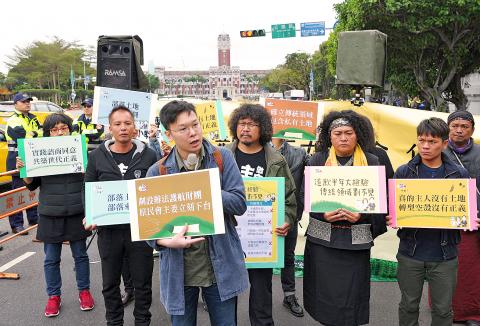Failure to include private land within the government’s legal definition of Aboriginal “traditional areas” will entrench historical oppression and injustice, Aboriginal campaigners said yesterday, blasting the government’s failure to meet its promise of transitional justice.
More than a dozen people associated with the Aboriginal Transitional Justice Classroom (原住民轉型正義小教室) gathered on Ketagalan Boulevard in front of the Presidential Office Building and shouted for villages to be allowed to declare their own traditional areas.
“Excluding private land amounts to an acknowledgement that the past behavior and policies which led to the theft of Aboriginal land were legitimate,” said Salone Ishahavut, a Bunun and a professor of indigenous development at National Chi Nan University.

Photo: CNA
She said that the 800,000 hectares which the Council of Indigenous Peoples has estimated will be covered under traditional area delineation guidelines published last week is a drastic reduction from the 1.8 million hectares it estimated should be included following a survey completed in 2007.
New guidelines restrict application of the “traditional area” label to government-owned land, explicitly excluding private land.
While it is not clear what portion of the reduction is attributable to the exclusion of private land, much of the prime real estate in traditional areas is now in private hands, Salone said.
“While this delineation of traditional areas was supposed to be about protecting our land rights, excluding privately owned land will mean the final and complete loss of original lands and their related memories,” she said.
Including privately owned land in the “traditional areas” would give Aboriginals a voice in development projects, while leaving formal ownership unchanged, she said.
“This policy is effectively saying that the system of private property can address many delicate questions and complicated processes,” said Lin Fei-fan (林飛帆), a Sunflower movement leader.
Lin said the council is using its administrative discretion to avoid tackling difficult aspects of transitional justice.
“Traditional areas should refer to the real-life space of our ancestors, but the council is focusing on the ‘status quo,’ which has already diverged from tradition. These delineation rules amount to an acknowledgement that our nation is unable to face the real history of indigenous peoples,” Amis singer-activist Panai Kusui said.
Including private land would spotlight the injustices involved in its acquisition, and could spark a national conversation, she said.
Another Amis, Mayaw Biho, a documentary filmmaker and a former head of Taiwan Indigenous TV, said the government has failed to follow through with promises to push for indigenous transitional justice in parallel with transitional justice efforts aimed at other abuses under Chinese Nationalist Party (KMT) authoritarian rule.
“The Presidential Office committee on indigenous justice held its first meeting in December [last year] and that was just an initial meeting which did not result in anything — but just look at all the Ill-gotten Party Assets Settlement Committee has been doing,” Mayaw said.

Taiwanese can file complaints with the Tourism Administration to report travel agencies if their activities caused termination of a person’s citizenship, Mainland Affairs Council Minister Chiu Chui-cheng (邱垂正) said yesterday, after a podcaster highlighted a case in which a person’s citizenship was canceled for receiving a single-use Chinese passport to enter Russia. The council is aware of incidents in which people who signed up through Chinese travel agencies for tours of Russia were told they could obtain Russian visas and fast-track border clearance, Chiu told reporters on the sidelines of an event in Taipei. However, the travel agencies actually applied

Japanese footwear brand Onitsuka Tiger today issued a public apology and said it has suspended an employee amid allegations that the staff member discriminated against a Vietnamese customer at its Taipei 101 store. Posting on the social media platform Threads yesterday, a user said that an employee at the store said that “those shoes are very expensive” when her friend, who is a migrant worker from Vietnam, asked for assistance. The employee then ignored her until she asked again, to which she replied: "We don't have a size 37." The post had amassed nearly 26,000 likes and 916 comments as of this

New measures aimed at making Taiwan more attractive to foreign professionals came into effect this month, the National Development Council said yesterday. Among the changes, international students at Taiwanese universities would be able to work in Taiwan without a work permit in the two years after they graduate, explainer materials provided by the council said. In addition, foreign nationals who graduated from one of the world’s top 200 universities within the past five years can also apply for a two-year open work permit. Previously, those graduates would have needed to apply for a work permit using point-based criteria or have a Taiwanese company

The Shilin District Prosecutors’ Office yesterday indicted two Taiwanese and issued a wanted notice for Pete Liu (劉作虎), founder of Shenzhen-based smartphone manufacturer OnePlus Technology Co (萬普拉斯科技), for allegedly contravening the Act Governing Relations Between the People of the Taiwan Area and the Mainland Area (臺灣地區與大陸地區人民關係條例) by poaching 70 engineers in Taiwan. Liu allegedly traveled to Taiwan at the end of 2014 and met with a Taiwanese man surnamed Lin (林) to discuss establishing a mobile software research and development (R&D) team in Taiwan, prosecutors said. Without approval from the government, Lin, following Liu’s instructions, recruited more than 70 software